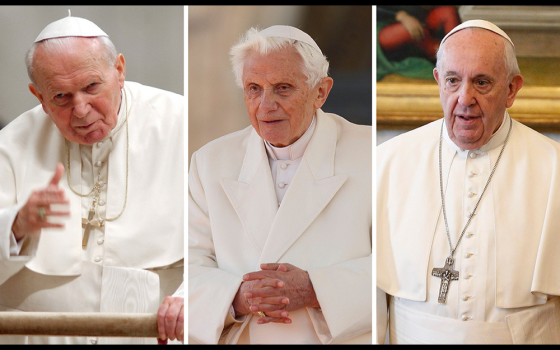Last Thursday, I linked to an article at Commonweal by David Bentley Hart that I have not been able to get out of my mind. He relates how an illness allowed him to reflect more deeply on the New Testament translation he was working on at the time, and he came away with a deeper sense of wonder at the sheer radicalness of the Gospel.
In this year of mercy, let me begin with a confession. I am green with envy when I consider how much I wish I had written this sentence Hart wrote:
My basic argument was that a capitalist culture is, of necessity, a secularist culture, no matter how long the quaint customs and intuitions of folk piety may persist among some of its citizens; that secularism simply is capitalism in its full cultural manifestation; that late capitalist 'consumerism' -- with its attendant ethos of voluntarism, exuberant and interminable acquisitiveness, self-absorption, 'lust of the eyes,' and moral relativism -- is not an accidental accretion upon an essentially benign economic system, but the inevitable result of the most fundamental capitalist values.
He goes on to relate that the Acton Institute's Samuel Gregg responded with sweet reasonableness that the Gospel does not condemn the possession of wealth per se, only its misuse, to which Hart replies: "… while Gregg had common sense on his side, I had the actual biblical texts on mine, and they are so unambiguous that it is almost comical that anyone could doubt their import." Game, set, match.
Of course, one could take out "capitalist culture" and replace it with "sexual liberation" and reach similar conclusions. Whatever else the Gospel of Jesus Christ does or does not do, it does not baptize sexual assertiveness. It is not that Jesus is opposed to gay men and women being freed from the stigma that has attached to them through the centuries, an issue that did not come up at the time. Nor need we believe that Jesus would condemn a young couple living together without first being married. No, it is that Jesus and his followers were convinced that the end of the world was nigh and that any and all thoughts that human sexuality could provide happiness, still less an experience of grace, were simply not there in the radical life that Jesus and his first followers lived at least as we find them related in the Scriptures.
Hart writes:
Throughout the history of the church, Christians have keenly desired to believe that the New Testament affirms the kind of people we are, rather than -- as is actually the case -- the kind of people we are not, and really would not want to be. The first, perhaps most crucial thing to understand about the earliest generations of Christians is that they were a company of extremists, radical in their rejection of the values and priorities of society not only at its most degenerate, but often at its most reasonable and decent. They were rabble. They lightly cast of all their prior loyalties and attachments: religion, empire, nation, tribe, even family. In fact, far from teaching 'family values,' Christ was remarkably dismissive of the family. And decent civic order, like social respectability, was apparently of no importance to him.
Now, I am still going to go visit my dad this week. And I am still going to go vote next month. I am not even going to consider a vocation to a religious order in which, at least in theory, the members live vows of poverty.
But how do we reclaim some of the radicalness of the Gospel in our own lives? We heard Jesus in yesterday's Gospel tell his disciples, and us, that if we had faith the size of a mustard seed, we could tell the mulberry tree to be uprooted and plant itself in the sea, and it would do so. How many of us actually believe such faith is possible? How many of us would really like the responsibility of possessing such faith?
I submit two thoughts in response to Hart's powerful, moving essay. First, and as a matter for social critics especially, I think that we in America have been lulled into forgetting the central role the poor play in Jesus' proclamation of the Gospel, and we need to reclaim that. A couple weeks ago, I helped organize a two-day seminar on Catholic social doctrine. And the first presentation I arranged was on the doctrinal and scriptural foundations of that doctrine. Too often, we think of Catholic social doctrine and we begin explaining it with reference to Leo XIII and Rerum Novarum. I do not wish to deny Leo's accomplishment, but the social doctrine of the church begins in the first chapter of Genesis, continues on through the Exodus and the giving of the law to Moses, through the prophets and finds its culmination in the teachings of Jesus. When you see someone, usually on the right, denouncing secularism without taking note of the material wealth of our culture, they are simply not being serious.
Second, and relatedly, I think we should not be too hard on ourselves when we domesticate the Gospel, but we should be very hard on ourselves when we forget that we are domesticating it. A sure sign of this forgetfulness is when we seek to baptize things that Jesus did not baptize: capitalism, Americanism, sexual liberation, bourgeois privilege, the First Amendment, etc. As Hart points out, the history of Christianity is too often the history of people believing the New Testament affirms us as we are.
We see in Pope Francis, I think, his desire to get back to the root of the matter. It is not easy when you are pope, and you must learn about the situation of the church throughout the world, judge men and women for their suitability for different offices in the church, play the part of a rockstar in order to spread the Good News and confirm the faithful. I think one of the reasons the Holy Father is so good at this is that he is, as he says, acutely aware of his own sinfulness. He knows how far he falls short of what Jesus calls us to and instead of denouncing the call and affirming himself, he takes holy refuge in the mercy of God and knows, and communicates that he knows, that he is not God. This, as much as anything, accounts for the sense of authenticity that people discern in this man's life.
So, let us take Hart's powerful article as the admonition it is. But, let us avoid what he terms the "deeply melancholy, almost Kierkegaardian sense that most of us who go by the name of "Christians" ought to give up the pretense of wanting to be Christian -- at least, if by that word one means not simple someone who is baptized or who adheres to a particular set of religious observances and beliefs, but more or less what Nietzsche meant when he said that there has been only one Christian in human history and he had died on the cross." Maybe not avoid it: His prose if too beautiful to avoid. Maybe just put it in perspective. Maybe domesticate it. When I read Hart's piece, I shared in that sense of melancholy he described for a moment, but then I walked the dogs and on that walk, another quote came to my memory. "We are all worms," said Winston Churchill. "But, I do believe that I am a glow-worm."
[Michael Sean Winters is NCR Washington columnist and a visiting fellow at Catholic University's Institute for Policy Research and Catholic Studies.]


